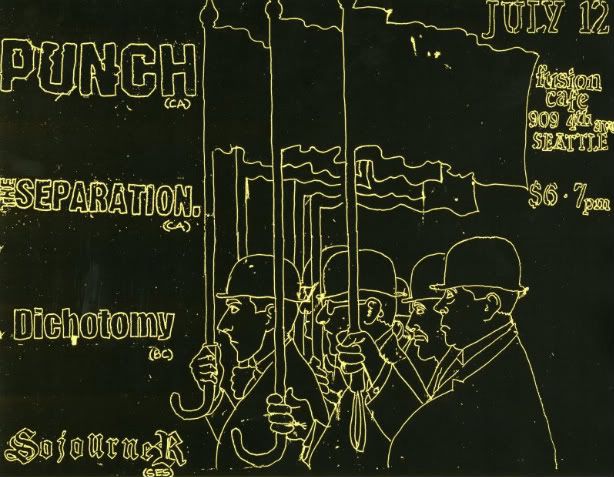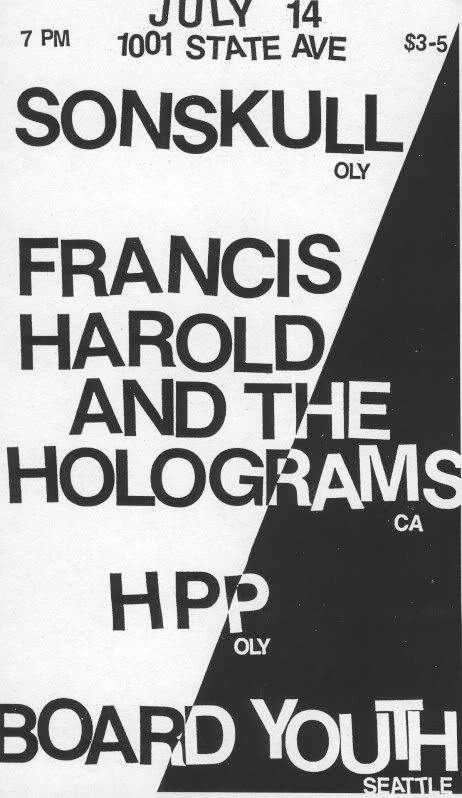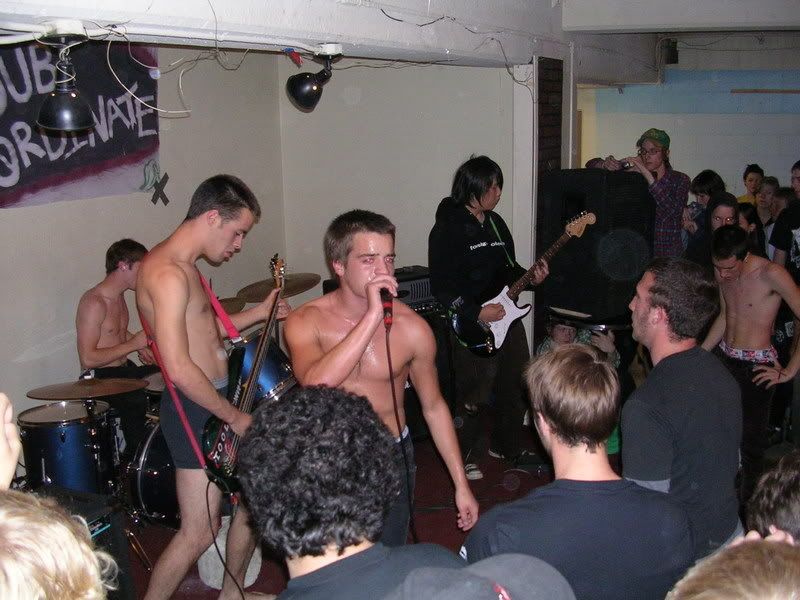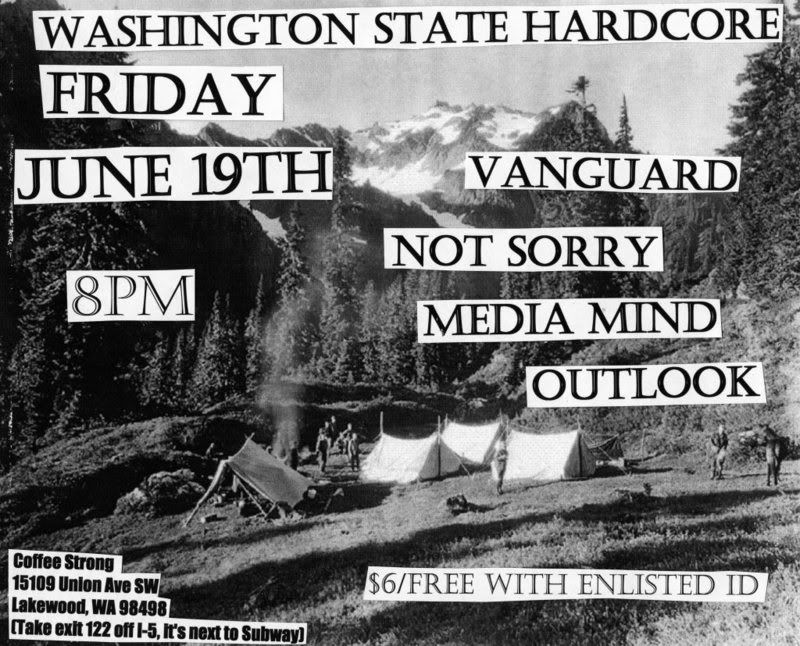
Friday, December 18, 2009
Tuesday, December 15, 2009
Adam's Birthday Show! UPDATE!
Directions from da North:
I-5s
exit 104 merge onto hwy 101N
exit Mud Bay Road/The Evergreen State College
slight left at Evergreen Pkwy NW/The Evergreen State College Pkwy
turn left at Overhulse PI NW
turn left at Driftwood Rd NW
Monday, December 14, 2009
Dehumanized full set
FREE SHOW!
Saturday, December 12, 2009
TOMORROW: BENEFIT SHOW
SUNDAY DECEMBER 13TH
TRAINYARD
POWER
HELL AND REASON
DEHUMANIZED
PSYCHO MONKEYS
7:00 PM $3-5
432 Division St. Westside Olympia
This show is a benefit for legal defense for anti-war activists. Come rage.
Wednesday, December 9, 2009
Saturday, December 5, 2009
Potluck at Chester House! Sunday 12/06/09
513 Milroy St Nw, Olympia WA 98502
Starts at 3 PM
Bring food if you can!!!!!!!!!
Thursday, December 3, 2009
New RED & BLACK songs and new band IN DEBT!!!!
www.oursound.net/redandblack
www.oursound.net/redandblack
www.oursound.net/redandblack
www.oursound.net/redandblack
Next up is the new Olympia band, In Debt. With politically charged lyrics and blistering hard riffs, In Debt closes out 2009 with a bang! Tanar from Sixes helped out on drums for the demo but because of his move to the east coast In Debt is looking for a solid drummer who could help write, tour, and put out records. Get in contact with them at indebt@oursound.net if you're interested or know someone who might be!!
www.oursound.net/indebt
www.oursound.net/indebt
www.oursound.net/indebt
www.oursound.net/indebt
Both demos were recorded by the talented Alek Gayton. Enjoy!!!
-OurSound.net
Tuesday, December 1, 2009
DECEMBER 13TH SHOW
TRAINYARD
DEHUMANIZED
2 more to be announced
7:00 PM
$3-5
432 Division St. Westside Olympia
This show is a benefit for legal defense for people involved in blocking shipments of US military vehicles for the occuption of Afghanistan. Come out to show support and have a good time!
PROTEST OBAMA'S 30,000 TROOP ESCALATION IN AFGHANISTAN!
So please come out!
Meet at Yauger park at 3:30. March to Cooper Pt. and Black Lake Blvd to vigil at this busy intersection from 4-6 PM.
Bring signs!
Sunday, November 22, 2009
Conversation group: Tuesday December 8th
Ecological crisis!
Shitty Government!
Let's come together and share concerns, ideas, fears, and experiences relating to the very serious political, social, environmental, and economic issues that we are facing.
Let's find common ground and talk about how we can use our collective power to affect change.
Come December 8th to the conversation group which will be hosted at James' house (if you don't know where it is call me: 360-701-9829).
Let's make sure this is a comfortable space where all people/perspectives are welcome.
Tuesday December 8th
James' House
Bring food if you want.
ALSO: if you want to bring any literature, zines, articles, books, films, etc. that would be great! Because these group talks will be around community and world issues, it would be awesome if we can all talk to each other about where we catch word of issues that concern us. The goal here is to learn from each other's perspectives through equal access to information that helped us form these perspectives.
Friday, November 20, 2009
Wealth & Property - News SIXES track up!
www.oursound.net/sixes
www.oursound.net/sixes
www.oursound.net/sixes
www.oursound.net/sixes
www.oursound.net/sixes
Sunday, November 15, 2009
New sixes song!
http://sudsdenim.blogspot.com/
We recorded the finished product today (with the help of ridiculous costumes once more [further footnote: ask about Red & Black EP recording documentation])and it should be up on Oursound shortly. Extreme thanks goes out to those who came to the show last night and made it a blast and a half! Thanks to Joshua Simpson, otherwise known as the infamous Sgt. X, for some vocal help. Suck it.

Friday, November 13, 2009
Friendly neighborhood reminder:
SATURDAY NOVEMBER 14th
The Spider Cave
Enumclaw WA
A Better Hope Foundation
Pullout
Sixes
Bully
Also, Red and Black just recorded an 11 song EP that will be available soon for listening pleasure. New Olympia band In Debt recorded the same day so be prepared for that as well. New White Wards songs... so on and so forth.
Sixes will be recording a new song for a compilation on Sunday so there will be a lot to blister your ears in the near future.
Tuesday, November 10, 2009
New White Wards recording posted!!
www.oursound.net/whitewards
www.oursound.net/whitewards
www.oursound.net/whitewards
www.oursound.net/whitewards
View the post below if you're interested in ordering a tape!
O U R S O U N D . N E T
p.s. some recording going down tomorrow, expect new songs from other OurSound artists very soon!
Monday, November 9, 2009
Thursday, November 5, 2009
SHOWS!
FRIDAY NOVEMBER 6th.
12970 Olalla Valley Rd SE
Olalla WA
The Flex
Red and Black
Sixes
Mondo Aggro
SATURDAY NOVEMBER 14th
The Spider Cave
Enumclaw WA
A Better Hope Foundation
Pullout
Sixes
Bully
BE THERE OR SUCK IT!
Friday, October 30, 2009
NEW OUTLOOK TRACKS AND ED-MAN RECORDS
www.oursound.net/outlook
www.oursound.net/outlook
www.oursound.net/outlook
Also OurSound is proud to welcome Ed-Man Records to the roster. Ed-Man Records is ran by Travis from Sixes and responsible for their 7" record as well as some other great releases. Check it out!
www.oursound.net/edman
www.oursound.net/edman
www.oursound.net/edman
More awesome things coming to OurSound in the next month, be sure to check back often!
OURSOUND.net
Monday, October 26, 2009
Aires and Graces fall west coast tour
| 11.07.09 | Los Angeles, CA @ Eastside Cafe |
| 11.08.09 | San Diego, CA @ Kadan’s w/ Knock Em Stiff, Northern Towns |
| 11.09.09 | Pomona, CA @ Characters W/ The Failures |
| 11.10.09 | San Diego @ The Radio Room |
| 11.11.09 | Las Vegas ????? |
| 11.13.09 | bay area ????? |
| 11.14.09 | San Francisco, CA @ The Hemlock w/White Flag Down (Matinee) |
| 11.15.09 | Sacramento, CA @ R5 Records (in store) |
| 11.16.09 | Redding, CA @ Bombay’s |
| 11.17.09 | Eureka, CA @ Lil Red Lion |
| 11.19.09 | Eugene, OR @ The Black Forest |
| 11.21.09 | Portland, OR @ Duckets |
| 11.22.09 | Olympia - Voyeur w/Tough Cookies, Back Alley Kicks |







Sunday, October 25, 2009
Important stuff.











Da Best








Last but not least.
Probably not the best idea that I know how to log in now.
Quick Updatesssss
-Sixes S/T songs are now available for download
-Outlook has recorded for a 7" and is in the process of getting it pressed right now
-Both White Wards and Red & Black have new demo cassettes coming out within the next month
So stay tuned for brand new songs from OurSound's best and also some new bands that will be added to the site very very soon.
Thanks!!!!
Tuesday, September 15, 2009
Monday, September 7, 2009
Come on! Yes!
-New band! Aires and Graces from Olympia, WA has been added to the roster
-Red & Black photos from their show at The Viaduct
-Songs from Sixes' new 7" have been added to their page. CHECK THAT SHIT OUT!
Some more updates will be coming soon including new stuff from Outlook and White Wards, as well as some new bands and other awesome stuff. Stay tuned!!!
OURSOUND.NET
Monday, August 17, 2009
Conference in Portland
Econvergence:
Northwest Regional Gathering on the Economic and Ecological Crises
October 2-4 2009, Portland, OR
First Unitarian Church, 1035 SW 13th Ave. Portland, Oregon 97205
Or if you don't know if you want to go at least check out the website and consider it:
http://www.econvergence.org/
Friday, July 31, 2009
Thursday, July 30, 2009
Vote for Oly City Council
Although our government is fucked and totally non-democratic, which can make voting pointless and discourage one from wanting to, I encourage anyone to vote in the local primary and upcoming election. As many of you already know, the current city council is working on gutting the culture of our city and gentrifying the shit out of it. They're bought out and working in the interest of corporate developers. They passed the noise ordinance, repealed the nuke-free ordinance, and passed the 'get homeless people off the sidewalk in downtown' ordinance so that when Triway Enterprise builds big condos right downtown, all the rich people that move into town won't be scared away by our music, the fact that there are homeless people everywhere, and Olympia's political activeness. SO, by voting in the primary you can try and ensure there are different candidates in the upcoming election so that we might get some better representation, if any (we're getting none at all at the moment).
If you care: Karen Veldheer, Janine Gates, and Stephen Buxbaum are running against the current city council regime. They have been endorsed by a number of community groups such as Friends of the Waterfront, and Citizens for a Responsive Local Government. They claim they are against condos downtown on the isthmus and that they will be more representative of city residents.
-James
here is the voter's pamphlet: http://www.co.thurston.wa.us/auditor/Elections/2009elections/aug/vp/voters_pamphlet_pdf.htm
Here's the general website about thurston county elections: http://www.co.thurston.wa.us/auditor/Elections/electns.htm
Friday, July 24, 2009
Saturday, July 18, 2009
Friday, July 17, 2009
Wednesday, July 1, 2009
Awesome NW shows coming up soon!


July 6th (Monday) at Old School Pizza in Olympia
HATRED SURGE (TX)
IRON LUNG
SEX VID
MAMMOTH GRINDER (TX)
$5, 10PM

Monday July 13th
6pm $3-5
Bully (Enumclaw) http://www.myspace.com/nwbully
White Wards (Olympia) http://www.oursound.net/whitewards/index.html
The Separation (Redding, CA) http://www.myspace.com/theseparationca
maybe +1 TBA
Chester's House
513 Milroy St Nw
Olympia, WA

^this show is in Olympia
july 14th
8pm
the separation
cowardice
media mind
warren avenue
+1 more tba
@ Coffee Strong
(15109 Union Ave. SW Lakewood, WA)
Saturday, June 13, 2009
OUTLOOK NEWS
We should have new music for you and new shirts (courtesy of Brian from MEDIA MIND).
Bye.
-A
Thursday, June 11, 2009
Tuesday, June 9, 2009
Essay
-James
Mechanical Clock-Time
Although there are many ways of reckoning time, both perceptively and organizationally, a single one has been systematized and universalized to take precedence across the globe over all others. This is mechanical clock-time [1]. The spread of clock-time reckoning has not been an isolated process. It has coincided with other Western European social systems and their role in world development. The history of clock-time shows a co-dependency between itself, industrialization, and capitalism [2] in which clock-time was primary in allowing the others to develop into their fully-fledged forms, and from which clock-time developed into a unique system of reckoning time in observance of the rhythms of the global economy.
I.
It is helpful to put clock-time in its social context to demystify and dissolve its cultural hegemony, and to compare and contrast it with other ways of viewing time in order to illuminate the uniqueness of its historical development. Thompson presents the distinction between clock-time and task-oriented time (Thompson, pp. 71). Task-orientation is different from clock-time because, as opposed to clock-time in which the means for measuring the passage of time are units in abstraction from the tasks coinciding to it, with task-oriented time, the tasks are the means of measuring time. Mumford describes a similar dichotomy, referring to the concept of Thompson’s ‘task-orientation’ as ‘organic time’. Organic time is “measured not by the calendar but by the events that occupy it. The shepherd measures from the time the ewes lambed; the farmer measures back to the day of sowing or forward to harvest,” etc (Mumford, pp. 15). [3] Thus clock-time made the activities of life dividable, and provided a rhythm - the rhythm of the hour, the minute, the second – that was an abstraction from those activities.
The binary Thompson and Mumford impose on all forms of time-reckoning is based on an understanding come to by simple distinction from modern mechanical time. Neither explores what time means to people who have lived, or still do, their own sense of time outside of mechanical time. Ostor rebukes the binary common to sociological studies in time, such as that implicit in Thompson and Mumford. He argues that such a binary is arrived at only by thinking in terms of “our time” and “their time”, that is, by lumping together many highly nuanced time-reckoning systems into a category characterized by their being ‘non-Western’, ‘non-modern’, and ‘pre-industrial’ (Ostor, pp. 4-11). Ostor suggests that it is much more demonstrative to take an anthropological approach; to let our understanding of time-reckoning systems of other societies be arrived at by drawing from their cultures, region by region. Ostor gives brief descriptions of different cultural regions: Aboriginal American, the Nuer of Sudan, Aboriginal Australia, and Hindu Bali (Ostor, 12-13; 13-14; 14-16; 16-18). However Ostor does not end up disagreeing with the distinction made between mechanical-time and task-oriented time. He disagrees with the method it is arrived at and the fact that it serves to obfuscate the many time-reckoning systems that have existed, and still do exist, around the world.
Although Ostor has shown that there are many ways time is conceived, the distinction between clock-time vs. task-oriented time remains. This is because it is a distinction that came about with the creation of clock-time. In Thomspon, Mumford, and Ostor’s analysis we find in common outside of clock-time reckoning the integration of activities of life. Clock-time shattered this, establishing the divisibility of activities by the passage of abstract units of time; a constant movement holding power over one’s subjective activities. Work and leisure, religion and life, each are allotted their duration and placed in a fully scheduled out rhythm of living, from which the constant trudge of seconds, minutes, and hours extends backwards into the past, and ever forward from the present into the future. [4]
The power of clock-time to dominate human activities and to defeat task-orientation only holds such weight as it is the universalized predominant societal standard of time. Its arrival at this point was the result of a specific historical process.
II.
Clocks and calendars have existed for thousands of years in many different forms. Most clocks and calendarical systems in ancient societies were based on lunar and/or seasonal cycles, and used for harmonizing society with religious ceremony. The first known society to measure Earth’s rotation, day and night, in terms of dividable units was ancient Egyptian. By the 13th century BC, Egyptian astronomers had divided the day into twenty-four periods, determined by the appearance of constellations (Steel, pp. 385-386), setting the precedent for the units of time – hours – which modern clocks would measure, and the referential by which modern time is divide.
The earliest known device resembling the modern mechanical clock is the water clock, used originally in ancient Egypt for the timing of astronomy according to its 24-period day (Whitrow, pp. 17). Water clocks set the precedent for the modern clock as a device acknowledging time as something of an objective, qualitatively uniform character; whose design is at once a means of measuring and a means of representing, an abstraction from, the passage Earth’s rotation. Although influential to mechanical clock-time, we find in these early forms of modern units and devices [5] their utilization as task-oriented. As the social standard of time, as well as the means by which the passage of time is recorded, they were determined by a system of experiences: the visibility of constellations, rhythms of the flooding of the Nile, and agricultural rhythms based on these. This is in opposition with their modern use and modern abstract units; the hour, minute, and second.
It was not until the 13th century in Western Europe that the mechanical clock took shape. Similar to previous societies, the need for clock-time existed in the religious sector of society. Mechanical clocks were necessary for ensuring punctuality in the highly disciplined, strictly scheduled life of Benadictine monasteries (Mumford, pp. 12-14; Whitrow 101-103). Earliest references to mechanical clocks appear in records throughout Western Europe of the late 13th century, describing verge-and-foliot clocks at churches (Whitrow, 104). It was at this time that the mechanical clock became secularized. Clock towers began to be erected in churches and public spaces in the 14th century (Thompson, 63), where their tolling every hour would order the rhythms of the community. With the invention of the pendulum in 1658 and the use of the spiral balance-spring in 1674, both clocks and watches became more accurate and more widely used (Thomspon, pp. 68). With the diffusion of clock-time into Western Europe we find the establishment of a clock-time oriented social standard of time. What was established as a means of measuring the specific schedule of monastic life became a means of imposing a totally new and different pace on entire outside communities.
The invention of the mechanical clock, by design, served as a prerequisite for the development of modern machinery: “The analysis of motion that accompanies the perfection of the clock, with the various types of gearing and transmission that were elaborated, contributed to the success of quite different kinds of machines” (Mumford, pp. 15). [6] The mechanical clock also provided a means of organizing society. It enabled the synchronization of a highly specialized division of labor and the timing of co-operation between men, machines, and their respective assigned tasks. Thus, the clock also brought on the age of machines, providing the circumstance for a society of large-scale industry and rapid production, communication, and exchange. The influence it had on, and therefore its inclusion in, the industrial revolution served to further secularize and expand the influence of mechanical clock-time.
The expansion of mechanical clock-time also coincided with the development of capitalism. Although early forms of the clock-time and the mechanical clock existed prior to the capitalist mode of production, whose origins lie in the 16th century, [7] capitalism was necessary for the systematization and development of clock-time as the dominant social time-reckoning system. [8] With the possibility of increasing productivity and thus profits, the pace of clock-time’s growth was “over accelerated, and the stimulus was over-applied” because of “the necessity to promote continual changes and improvements, which has been characteristic of capitalism” (Mumford, 27).
But it was not just clock-time that required capitalism for its development; capitalism required clock-time just as much, if not more. This is for several reasons: first, because under capitalism labor is a commodity productively consumed in the production process, mechanical clock-time provided a means of quantifying and measuring labor as a factor of production (Hassard, pp. 19-20). Second, because of the organization of capitalist society characterized by separation, “private individuals producing commodities independently of each other” and the separation of workers and the means of production, mechanical clock-time provided the means for synchronizing these independent actors (Marx, pp. 165, 874). Also, because accumulation on an extensive scale is a necessary element in the capitalist mode of production, and because the aforementioned separation of societal actors is reproduced and intensified with expansion, clock-time is required for synchronizing the increasing stratification of actors of capitalist society (Marx, pp. 448). Third, because industrialization is a necessary stage in the growth of capitalism and because mechanical clocks were a primary component of the industrial revolution, capitalism is indebted to mechanical clock-time for enabling the ability to expand into factory production and large-scale industry.
Thus, capitalism seized upon clock-time – as it did with the machine – for its ability to increase productivity by providing access to a strictly ordered, synchronized production process. [9] Clock-time, industrialization, and capitalism were bound to one another. As new markets were formed with the expanding capitalist mode of production, facilitated by industrial production, clock-time expanded too.
III.
The height of growth of clock-time under this tri-force is the International Standard Time, the means of synchronizing the global economy to a standard of mechanical clock-time. With the advance of industrial capitalism “the revolution in the modes of production of industry and agriculture made necessary a revolution in the general conditions of the social process of production, i.e. the means of communication and transport” (Marx, pp. 505-506). This need was met with the steam ship, the railroad, and the telegraph; inventions which revolutionized the means of transportation and communication. As the interdependence of communities quickly increased with an expanding division of labor, the ability to quickly communicate and travel from one area to another was problematic because each community held their own local clock-time according to their position on the Earth. The development of International Standard Time served to solve this problem.
The British Post Office, whose service by stage coach was set up in 1784 and began to quickly spread, [10] found it problematic to run mail coaches with the strict schedules they had set up [11] because of the different local times of the communities it would visit. As it began using railways around the 1840’s, many stations across Britain adopted London time, which could vary anywhere from 4-14 minutes from their actual local time (Thrift, pp. 121-122). Here was the first attempt in history to synchronize different regions to the mechanical clock-time of a single locality. Eventually, in 1842, the Railway Clearing House recommended and was permitted by the British Post Office to adhere to the time kept by the Royal Observatory in Greenwich because it was “the most reliable observatory” (Zerubavel, pp. 6). Here was established Greenwich Mean Time (GMT), the starting point for the modern International Standard Time and International Time Zones.
The establishment of GMT as a national and international standard of time rapidly followed. By 1855, 95% of public clocks in Britain were set to GMT. Following Britain, privately owned railroad companies in the US form the American Railway Association in effort to discuss how to establish a time standard. Because US crossed so much latitude (how much), the railroad companies had an incredible difficulty coordinating their clocks and schedules with highly variable local times of different stations. In 1883, they determined different time zones which were set at every 15 latitudes from Greenwich. The US congress legalized this decision in 1918 by passing the Standard Time Act, and in 1966 the Uniform Time Act which “virtually made standard time mandatory, establishing actual penalties for failure to observe it” (Zerubavel, pp. 10). Greenwich was recognized as the centerpiece of standard clock time on an international level.
The final step to an international time standard that would synchronize and facilitate the rapidly growing global economy was taken in 1884 at the International Meridian Conference, brought on by the development of the Atlantic Cable, a telegraph spanning the Atlantic Ocean from Britain to the US. It was decided here to adopt the method of the US railroad companies and set time zones at every 15 latitudes starting from Greenwich. The latitude where Greenwich lies was established as the prime meridian, from which of International Time Zones were established.
Although mechanical clock-time was necessary for capitalism and industrialization, it was conditioned directly by capitalism to the growing global economy as the dominant standard of time-reckoning.
IV.
The development of mechanical clock-time has not been a power-neutral process. Power dynamics are in play with all conditions of a societal standard of time. From ancient Egypt, to the Benedictine monasteries, to International Standard Time the ruling class holding power as time-keepers. Whether they be priests commanding farmers with the ability to predict the flooding of the Nile, railroad barons of the capitalist class setting a standard clock-time for the sake of global commerce, or colonizers holding the ‘rationality’ of clock-time as a rational for banning the traditional time-observances of the colonized, those with power in society establish time-standards as a means to organize economic and social relations according to their agenda. Especially demonstrative of classes with the power of wealth and knowledge controlling the rhythms of society is the fact that the first personalized mechanical clocks and watches were symbols of status; luxury items made of gold and silver only accessible to the wealthy upper-class. (Mumford, pp. 16; Thompson, pp. 67-68). We see now quite literally why Debord declared those in power as “the owners of history” who “have given time a direction, a direction which is also meaning” (Debord, ~132).
There is, however, a qualitative distinction between the nature of exploitation we find under task- and clock-time oriented societal standards. With the former we have schedules of time coordinating society to the passage of experiences based on the natural conditions of one’s localized time. With the latter we have abstract units used to mark rhythms in the widely dispersed system of time based on the rhythms of the global economy. With task-orientation we find the standard of time as a means of rationalizing peoples’ activities and experiences as they are determined by rhythms of their local, natural time: the seasonal year or lunar cycles holding religious connotations with which to establish schedules for an orderly society. The standard of time acknowledges qualitatively different activities allotted qualitatively different experiences of time. With clock-time orientation we find time running alongside one’s activities regardless of what they are. With the help of the clock, the rhythms of one’s localized time and one’s activities are marked as qualitatively uniform with the rhythms of the rest of the globe. The clock, which is situated to mark the times of the day, instead marks the rhythms of the global economy.
The experience of the rhythms of the economy, as opposed to one’s localized time, is the result of the spread of the interdependent systems of clock-time, industrialization, and capitalism. The global dominance of these systems facilitates a process by people who do not experience the conditions of their localized rhythms of Earthly events. Rather than witness the seasonal rhythms of their locality, someone in the Pacific Northwest can eat fruit year-round because of the interconnected global trade which brings to the area produce of growers in the tropics or the southern hemisphere. Rather than being affected by a period of harsh weather conditions, one can watch their crops withstand because of advancements in industrial inventions that have created Genetically Modified Organisms. Such advancements in commerce and industry have enabled one’s abstraction from their localized time.
Although one’s activities are now determined by the rhythms of a capitalist world-system marching to the beat of International Standard Time, one’s experiences are mere fragments of this phenomenon. Because of the highly intensified division of labor, each human role and perspective system is limited. The goods or services which one consumes or productively consumes come from all reaches of the world, provided by the coordination of the economy and mechanical clock-time on a global scale. Yet the aggregate of individual experiences of time – seasonal rhythms, climactic rhythms, tides, etc. - in which production or transportation occurs is not embodied in the exchange of commodities. Therefore, whereas International Standard Time establishes over people the rhythms of the global economy in its totality, this totality can never be recognized or experienced.
Under International Standard Time, the Earth is likened to a global factory. Whereas the clock on the wall dictates the rhythms of the factory workers, International Standard Time dictates the rhythms of each specialized productive entity in the global economy. Although these bodies may produce separate products in competition, each contributes as a part of the entire organism, the co-dependent social systems of mechanical clock-time, industrialization, and capitalism. Together as they grow, they reproduce this system on an expanding scale. Thus we have a clock-time-oriented global economy as the standard by which activities are measured and organized whose dominance and scale is constantly increases. This also influences the increasing dictation of one’s own fragmented experience of the global economy by those rhythms, and the increasing separation of one’s activities and experiences of time from one’s localized rhythms of the Earth.
Works Cited:
Blyton, Paul, John Hassard, Stephen Hill, and Ken Starkey. Time, Work and Organization. 1989. New York: Routledge, 1990.
Debord, Guy. The Society of the Spectacale. Trans. Ken Knabb. (Original date). (place): Treason Press,
2002.
Hassard, John, ed. The Sociology of Time, New York: St. Martin’s Press Inc., 1990.
Lukacs, Georgy. History and Class Consciousness. 1968. Trans. Rodney Livingston. Cambridge, Mass.: MIT Press, 1971.
Marx, Karl. Capital: A Critique of Political Economy. Trans. Ben Fowkes. Vol. 1. 1976. New York: Random House, Inc., 1977
Mumford, Lewis. Technics and Civilization. 1934. San Diego: Harcourt Brace and Company, 1963.
Ostor, Akos. Vessels of Time: An Essay on Temporal Change and Social Transformation, Delhi; New York: Oxford University Press, 1993.
Steel, Duncan. Marking Time: The Epic Quest to Invent The Perfect Calendar. New York: John Wiley and Sons, Inc., 2000.
Thompson, E.P. “Time, Work-Discipline, and Industrial Capitalism.” Past and Present Dec. 1967: pp. 57-97.
Whitrow, G.J. Time in History: The evolution of our General Awareness of Time and Temporal Perspective, New York: Oxford University Press, 1988.
Zerabuval, Eviatar. “The Standardization of Time: A Sociohistorical Perspective.” The American Journal of Sociology Jul. 1982: pp. 1-23.
[1] I will refer to the general conception of time invoked from clock time as ‘mechanical time’, and the actual system of time measurement and scheduling as ‘clock-time’. ‘Mechanical clock-time’ will be used when both are applicable.
[2] I will deal with capitalism and industrialization separately to illuminate the different relationships they have with clock-time. Although capitalism and industrialization have necessitated each other and developed together in many ways, I see them as two different phenomena having different origins.
[3] “While mechanical time is strung out in a succession of mathematically isolated instants, organic time…is cumulative in its effects. Though mechanical time can, in a sense, be speeded up or run backward, like the hands of a clock or the images of a moving picture, organic time movies in only one direction – through the cycle of birth, growth, development, decay, and death” (Technics and Civilization, Mumford pp. 16). Thompson’s dichotomy is clearly inspired by Mumford’s. His ‘task-orientation’, however, is an expansion on Mumford’s ‘organic time’, which Mumford only gives brief description of.. (ibid., pp. 15)
[4] “The divorce between work and the individual capacities and needs of the worker produces comparable effects upon the consciousness” (Lukacs, pp. 98). Although here Lukacs speaks of effects produced by capitalism, these same effects are produced with clock-time.
[5] Water clocks have been used somewhat widespread following ancient Egypt, and are found similarly used in ancient Babylon and China.
[6] “Here was a new kind of power-machine in which the source of power and the transmission were of such a nature as to ensure the even flow of energy throughout and to make possible the regular production and a standardized product”, that product being accurate timing (Technics and Civilization, Mumford, pp. 14-15). “The clock was the first automatic device to be used for practical purposes, and from it the whole theory of the production of regular motion evolved…Nor can there be any doubt that it was the clock which, in the eighteenth century, first suggested the application of automatic devices (in fact, actuated by springs) in production. It is historically demonstrable that Vaucanson’s experiments in this field stimulated the imagination of English inventors to a remarkable extent”, (MECW, vol. 41, Marx, p. 448)
[7] I am not talking here about merchant capital which was on the rise from 1000-1300 (Canterbury, pp. 26-29). Merchants’ capital and interest-bearing capital “appear before the modern primary form of capital” (Marx, pp. 267). I speak of the capitalist mode of production from a Marxist perspective, “characterized by the fact that labour-power…takes on the form of a commodity” (Marx, pp. 274).
[8] What Mumford says about machines is true for clock-time: “Whether machines would have been invented so rapidly and so zealously without the extra incentive of commercial profit is extremely doubtful: for all the more skilled handicraft occupations were deeply entrenched, and the introduction of printing for example was delayed as much as twenty years in Paris by the bitter opposition of the guild of scribes and copyists” (Technics and Civilization, pp. 26)
[9] It is possible to imagine capitalism existing without clock-time. However, without the advance of machinery facilitated by the invention of the mechanical clock, capitalist society would have remained at the stage of handicrafts. Also without the ability to synchronize a highly intensified division of labor and complicated systems of transportation and communication, capitalist society would have remained at the scale of independent producers or, at most, a very simple stage of handicrafts.
[10] Thrift, “By 1785 regular stage coach services were in operation from London to 25 towns.” Pp. 120
[11] Zerubavel: “The British mail-coach service also became the first public service ever to provide regularity, when it started in 1784 to run its mail coaches in accordance with strict schedules”. Pp. 6
Sunday, May 31, 2009
Hardcore Show... June 8th
1001 State Ave.
Olympia, WA
Video Disease
The Timebombs
White Wards
Jacket Pocket
Show starts at 7PM.
$5
Flyer soon...
Friday, May 22, 2009
Sunday, May 17, 2009
SIXES news:
New T-Shirts will be done by Rainfest. We're playing first on day 1 so be sure to be on time. Here's what the shirts look like...

Upcoming shows...



JUNE 13TH
@THE GREEN RIVER COMMUNITY COLLEGE
BEHOLD (final western wa appearance)
VANGUARD
POVERTY BAY SAINTS
PRESIDENT KENNEDY IS ASSASSINATED
SIXES
HELL & REASON
COOL RUNNINGS
+MORE

After that we're in the process of booking a two week tour in late August so we can unleash those 7"s on the world. We'll be heading a little farther east in to the middle Americas this time. What up CO?
If anyone has interest in purchasing either a tape (that we only have maybe 15 left of) or a shirt, please contact tanarstalker at gmail dot com
It's Our Sound.
-Tanar/Sixes
www.holyterror.com
Saturday, May 16, 2009
TRAINYARD AND OUTLOOK DOWNLOADS
Outlook
http://outlook-olyhc.angelfire.com/Outlook.rar
Trainyard
http://www.mediafire.com/download.php?zzznztnwmzy




INSUBORDINATE
OLYMPIA,WA
(on indefinite hiatus)
DEMO
http://www.mediafire.com/?nfmityyn3wu
LP
http://www.mediafire.com/?khwl1mhiyzz
LIVE
http://www.mediafire.com/?anwmkw1ynzw
To order an LP for 7.00
contact
jamesoly@yahoo.com or iansubordinate@hotmail.com








